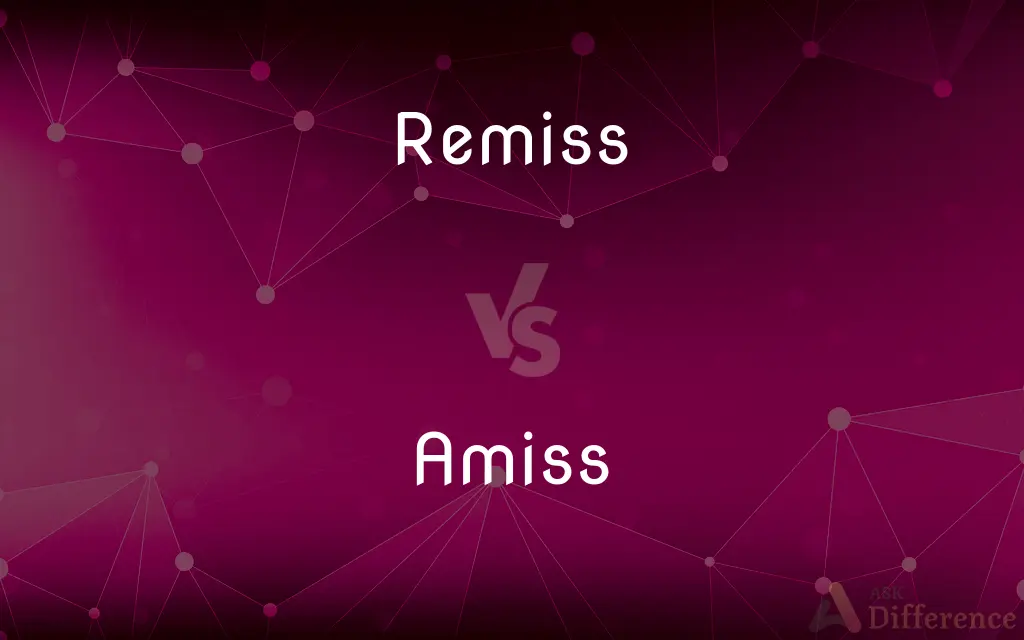Remiss vs. Amiss — What's the Difference?
By Tayyaba Rehman & Urooj Arif — Updated on March 6, 2024
Remiss involves negligence or carelessness, whereas amiss signifies something wrong or out of order.

Difference Between Remiss and Amiss
Table of Contents
ADVERTISEMENT
Key Differences
Remiss often describes a failure to do something that one should, indicating negligence or a lack of attention to duty. For instance, if a student is remiss in their studies, they neglect their academic responsibilities. Amiss, on the other hand, suggests that something is not right or is out of the normal order. This could refer to a situation, an outcome, or the state of things. When someone says "something is amiss," they imply that there's a deviation from what's expected or normal.
While remiss primarily focuses on the aspect of human behavior or performance, highlighting negligence or lack of diligence, amiss applies more broadly to situations, conditions, or even objects, indicating that something is wrong or misplaced. A remiss action is often a personal failure, whereas something being amiss might not directly relate to an individual's actions.
The term remiss often implies a moral or ethical responsibility that has been overlooked or ignored, thereby resulting in some form of failure or shortcoming. Amiss, by contrast, does not inherently carry a moral judgment but rather indicates a deviation from the norm or an unexpected error that has arisen, possibly without any human negligence.
In terms of usage, remiss is typically used to describe a person's actions or lack thereof, emphasizing a failure in duty or responsibility. Amiss, however, is used to describe the state or condition of something, suggesting that an error or discrepancy has occurred, often without implying blame.
The consequence of being remiss is often more directly tied to the individual's actions or inactions, suggesting a personal failure that could have been avoided with proper attention or effort. Amiss, however, points to an outcome or situation that is off, potentially without a clear cause or responsible party, focusing more on the state of affairs than on personal accountability.
ADVERTISEMENT
Comparison Chart
Definition
Showing negligence or inattention.
Out of place; not in perfect order.
Usage Context
Refers to people and their actions or failures.
Refers to situations, outcomes, or the state of things.
Connotation
Often carries a moral or ethical implication of negligence.
Indicates something is wrong without implying moral judgment.
Implication
Personal failure or lack of effort.
Error or discrepancy, often without clear blame.
Focus
On the individual's actions or inactions.
On the state or condition of something.
Compare with Definitions
Remiss
Negligent or careless in performing a duty or task.
The teacher was remiss in not checking the homework.
Amiss
Wrong; not suitable or according to standards.
There's something amiss with this equation.
Remiss
Prone to overlook or omit what ought to be done.
She was remiss in informing the team about the meeting change.
Amiss
Out of the normal order or condition.
The scattered books on the floor were amiss.
Remiss
Lacking attention or diligence.
He was remiss in his response to the urgent emails.
Amiss
Incorrectly or inappropriately arranged.
The files on the desk were placed amiss.
Remiss
Indicating a dereliction of duty.
The officer was remiss in fulfilling his patrol responsibilities.
Amiss
Not in perfect condition; having something wrong.
The mechanism of the clock is amiss.
Remiss
Characterized by a failure to maintain standards of care or attention.
The security guard was remiss in his patrol duties.
Amiss
Indicating a deviation from the expected or the normal.
His silence during the meeting was amiss.
Remiss
Lax in attending to duty; negligent.
Amiss
Not in perfect shape; faulty.
Remiss
Not energetic or exact in duty or business; careless; tardy; slack; hence, lacking earnestness or activity; languid; slow.
Amiss
Wrong; faulty; out of order; improper; as, it may not be amiss to ask advice.
His wisdom and virtue can not always rectify that which is amiss in himself or his circumstances.
Remiss
The act of being remiss; inefficiency; failure.
Amiss
Not quite right; inappropriate or out of place
There was something amiss about his calculations
Remiss
Failing in what duty requires;
Derelict (or delinquent) in his duty
Neglectful of his duties
Remiss of you not to pay your bills
Amiss
Wrong; faulty; out of order; improper or otherwise incorrect.
He suspected something was amiss.
Something amiss in the arrangements had distracted the staff.
Remiss
Lacking care or attention to duty; negligent
It would be very remiss of me not to pass on that information
Remiss
At fault; failing to fulfill responsibility, duty, or obligations.
I would certainly be remiss if I did not give credit where credit was due.
Remiss
Not energetic or exact in duty or business; not careful or prompt in fulfilling engagements; negligent; careless; tardy; behindhand; lagging; slack; hence, lacking earnestness or activity; languid; slow.
Thou never wast remiss, I bear thee witness.
These nervous, bold; those languid and remiss.
Its motion becomes more languid and remiss.
Common Curiosities
How can something be amiss?
Something can be amiss if it is out of the normal order, wrong, or not in the expected condition.
Is being remiss always intentional?
Not necessarily; being remiss can stem from unintentional negligence or oversight.
Can a person be described as amiss?
Typically, amiss is used to describe situations or conditions, not people.
How does one correct being remiss?
Correcting remiss behavior involves taking responsibility and improving diligence or attention to duties.
What does it mean to be remiss?
Being remiss refers to a lack of attention or carelessness in one's duties or responsibilities.
Can a situation be both remiss and amiss?
A situation might involve remiss actions leading to an amiss outcome, but the terms highlight different aspects.
Is noticing something amiss a skill?
Yes, recognizing when something is amiss can require observance and attention to detail.
Are remiss actions always avoidable?
Many remiss actions are avoidable with proper care and attention.
What are signs something is amiss?
Signs include deviations from the norm, unexpected outcomes, or irregularities.
Can being remiss affect relationships?
Yes, remiss behavior can strain or damage relationships due to negligence or lack of care.
How does one identify remiss behavior in themselves?
Identifying remiss behavior involves self-reflection and awareness of one’s duties and responsibilities.
Can an environment be amiss?
Yes, an environment can be amiss if its condition is disordered or not as expected.
Does remiss imply fault?
Yes, remiss implies a fault due to negligence or inattention.
Is amiss always negative?
Typically, yes, as it suggests something is wrong or not as it should be.
Can technology be amiss?
Yes, technology can be described as amiss if it’s malfunctioning or not operating as expected.
Share Your Discovery

Previous Comparison
Heterozygous vs. Hemizygous
Next Comparison
Attorney vs. ProsecutorAuthor Spotlight
Written by
Tayyaba RehmanTayyaba Rehman is a distinguished writer, currently serving as a primary contributor to askdifference.com. As a researcher in semantics and etymology, Tayyaba's passion for the complexity of languages and their distinctions has found a perfect home on the platform. Tayyaba delves into the intricacies of language, distinguishing between commonly confused words and phrases, thereby providing clarity for readers worldwide.
Co-written by
Urooj ArifUrooj is a skilled content writer at Ask Difference, known for her exceptional ability to simplify complex topics into engaging and informative content. With a passion for research and a flair for clear, concise writing, she consistently delivers articles that resonate with our diverse audience.















































